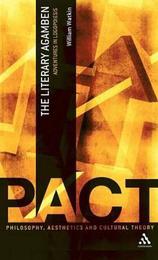
|
The Literary Agamben: Adventures in Logopoiesis
Hardback
Main Details
Description
This is the first complete account of all Giorgio Agamben's philosophical work on literature. While Giorgio Agamben is most widely known for his political philosophy, at least a third of his output is dedicated to unique, technical and revelatory readings of literature. Indeed, it is impossible to fully understand Agamben's overall movement towards a Messianic philosophy to come without knowledge of the role of poetry in his ontology. The Literary Agamben considers the totality of Agamben's detailed and varied work on literature and poiesis. Organised around three areas, language, poiesis and modernity, the book explains Agamben's theory of literary singularity in all its complexity. William Watkin details Agamben's particular 'ontological' take on linguistics, works through Agamben's definition of poetry as the tension between semantic and semiotic, and engages with Agamben's aggressive yet insightful critique of modern art as productively nihilistic. The book presents Agamben's overall conception of poiesis and its relevancy to future readings in literature, as well as an understanding of how poiesis forms the crucial third part of Agamben's overall philosophical system alongside the more widely disseminated terms 'exception' and 'potentiality'. The Philosophy, Aesthetics and Cultural Theory series examines the encounter between contemporary Continental philosophy and aesthetic and cultural theory. Each book in the series explores an exciting new direction in philosophical aesthetics or cultural theory, identifying the most important and pressing issues in Continental philosophy today.
Author Biography
William Watkin is professor of contemporary literature and philosophy at Brunel University, UK. He is the author of In the Process of Poetry: The New York School and the Avant-Garde (2001), On Mourning: Theories of Loss in Modern Literature (2004), The Literary Agamben (2010) Agamben and Indifference (2014) and Badiou and Indifferent Being (Bloomsbury, 2017).
|